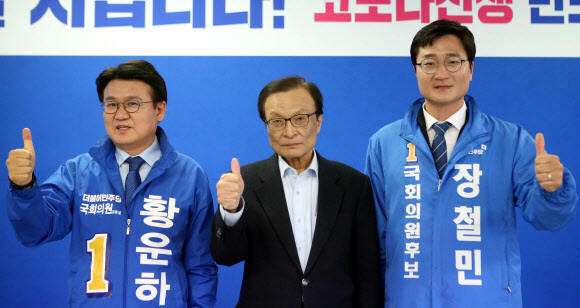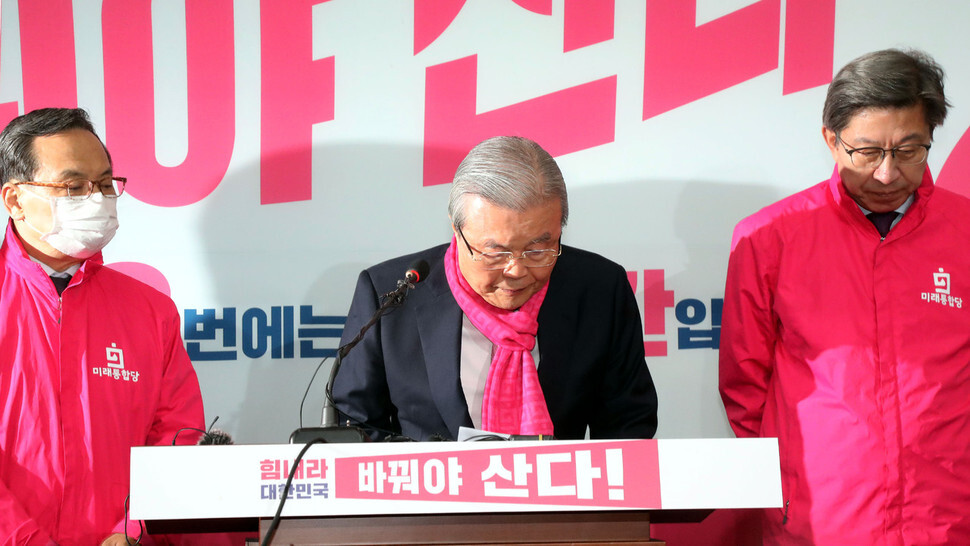hankyoreh
Links to other country sites 다른 나라 사이트 링크
[Column] The Apr. 15 election will serve as judgement day for the conservative opposition

In September 2005, Hurricane Katrina struck the city of New Orleans -- the birthplace of jazz -- leaving a death toll of over 1,800. Both the US and the rest of the world were stunned. While there had been cases before of hundreds to thousands of people dying in hurricanes or cyclones in the Caribbean or in South Asia, people could not fathom how nearly 2,000 people could have died from a natural disaster in the world’s strongest superpower, the United States.
The city of New Orleans lies below sea level, and it had already been foreseen that the levee protecting it would not withstand the effects of a major hurricane. City authorities warned downtown residents multiple times to evacuate to the outskirts. But black residents in poor communities did not have access to cars. Some managed to escape with their lives by walking to the Superdome stadium in the city center. It was an absurd tragedy -- a calamity that could have been averted by the government simply sending dozens of school buses to transport the residents.
Fifteen years later in 2020, we can look to the Hurricane Katrina tragedy to see the key elements determining the success and failure of South Korea and the US and their respective responses to the coronavirus. This time around, South Korea has demonstrated outstanding capabilities of social mobilization to the rest of the world. The efforts by companies to immediately begin developing diagnostic kits and producing masks at the government’s request cannot be dismissed as merely an attempt to make money. The conversion of private training centers into treatment centers for patients with minor symptoms was a timely gesture that helped to avert a collapse in the healthcare system. The dedication of health professionals cannot be overlooked in our ability to muster over 1,000 public health doctors and military doctors early on after the explosive increase in infections in the Daegu and North Gyeongsang Province area. Over and over again, the World Health Organization (WHO) has underscored the huge importance of “social mobilization,” or a social contract between citizens and government, in contemporary battles with infectious disease. In that sense, South Korea boasts a far stronger and more efficient system than either the US or the countries of Europe.

To be sure, social mobilization can go too far and veer toward “government control.” Under a government control scenario, the public is obliged to comply with even the most unreasonable orders by a government. We do not have to search back very far in our history to find illustrations of this in the coercive fundraising practices that took place during the Park Geun-hye administration. Having gone through that excruciating experience, South Korean society now appears to be finding its own balance of social mobilization rooted in voluntary participation and a sense of civic duty.
The same is true of the issue of using personal information. There is no denying using mobile devices for contact tracing and sharing patient’s movement paths has contributed to stemming the coronavirus’s spread. Even so, there has been some debate over privacy issues. Many in the US and Europe have maintained this kind of approach would never be adopted in their home countries, with their emphasis on the value of information privacy. Globally, we should be on guard against the coronavirus response leading to deepening authoritarianism.
But questions of how we apply things like mobile phone tracking and electronics wristband in comparison with other countries is a matter for debate and consensus. Early last year, the opposition parties and conservative media were denouncing the “backsliding” of democracy,” quoting figures from the US-based Freedom House that rated the Moon Jae-in administration as “less democratic” than the administration of Hungarian Prime Minister Viktor Orban. Since then, Hungary has enacted a special coronavirus law that supersedes all other laws and grants the Orban administration emergency powers that have allowed it to neutralize the Hungarian National Assembly.
Compared to the US and the advanced countries of Europe -- which have been barring people from going outside, closing restaurants, and shutting down national borders outright – is the South Korean government really violating the privacy of its citizens to a greater degree?
What we should take note of is how surprisingly little concern there is that the government’s acquisition of mobile device data will lead to different forms of monitoring and surveillance. This may simply be a reflection of how urgent the coronavirus response is. But I find myself asking whether this would also have been true during the Lee Myung-bak and Park Geun-hye administrations, which were plagued with issues of monitoring by intelligence and investigative agencies. It looks as though many people feel that after the experience of nine years of conservative rule and the ensuing impeachment and candlelight demonstrations, the current administration is at least a bit more trustworthy when it comes to protecting democracy and personal freedoms.
Conservatives still haven’t taken responsibility for public safety failures that led to Sewol tragedyHerein lies the main reason that the general election on Apr. 15 is shaping into a judgment not against the Moon administration, but against its opposition. The key message being sent by United Future Party (UFP) leader Hwang Kyo-ahn and the party’s election countermeasures committee chairperson Kim Jong-in is that the “one-party Moon Jae-in dictatorship must be stopped.” They’ve even been claiming that if the ruling party assumes a majority in the National Assembly, elections will “disappear,” putting us on the road to long-term rule by one party. This is all too divorced from what the public is actually feeling. At this rate, the election is bound to turn into a contest between the past and present -- a race between a UFP that seems stuck back in the year of the 2014 Sewol ferry tragedy and the days of Lee Myung-bak and Park Geun-hye on the one hand, and a Moon administration that is just trying to get through 2020 on the other.
When Hwang questions why religious groups are being blamed for the government’s response failure, he only underscores the regressions that took place under the Park administration, which showed no sense of responsibility whatsoever at the time of the Sewol tragedy. The first order of business for the opposition right now is to answer the question of whether it’s even capable of protecting the lives and safety of the South Korean public.
By Park Chan-su, editorial writer
Please direct comments or questions to [english@hani.co.kr]

Editorial・opinion
![[Editorial] Korea must respond firmly to Japan’s attempt to usurp Line [Editorial] Korea must respond firmly to Japan’s attempt to usurp Line](https://flexible.img.hani.co.kr/flexible/normal/500/300/imgdb/original/2024/0514/2317156736305813.jpg) [Editorial] Korea must respond firmly to Japan’s attempt to usurp Line
[Editorial] Korea must respond firmly to Japan’s attempt to usurp Line![[Editorial] Transfers of prosecutors investigating Korea’s first lady send chilling message [Editorial] Transfers of prosecutors investigating Korea’s first lady send chilling message](https://flexible.img.hani.co.kr/flexible/normal/500/300/imgdb/original/2024/0514/7917156741888668.jpg) [Editorial] Transfers of prosecutors investigating Korea’s first lady send chilling message
[Editorial] Transfers of prosecutors investigating Korea’s first lady send chilling message- [Column] Will Seoul’s ties with Moscow really recover on their own?
- [Column] Samsung’s ‘lost decade’ and Lee Jae-yong’s mismatched chopsticks
- [Correspondent’s column] The real reason the US is worried about Chinese ‘overcapacity’
- [Editorial] Yoon’s gesture at communication only highlights his reluctance to change
- [Editorial] Perilous stakes of Trump’s rhetoric around US troop pullout from Korea
- [Guest essay] Preventing Korean Peninsula from becoming front line of new cold war
- [Column] The state is back — but is it in business?
- [Column] Life on our Trisolaris
Most viewed articles
- 1Ado over Line stokes anti-Japanese sentiment in Korea, discontent among Naver employees
- 2[Column] Samsung’s ‘lost decade’ and Lee Jae-yong’s mismatched chopsticks
- 3Korean opposition decries Line affair as price of Yoon’s ‘degrading’ diplomacy toward Japan
- 4US has always pulled troops from Korea unilaterally — is Yoon prepared for it to happen again?
- 5Korean auto industry on edge after US hints at ban on Chinese tech in connected cars
- 6[Editorial] Yoon’s gesture at communication only highlights his reluctance to change
- 7[Correspondent’s column] The real reason the US is worried about Chinese ‘overcapacity’
- 8[Column] Will Seoul’s ties with Moscow really recover on their own?
- 9[Photo] Korean students protest US complicity in Israel’s war outside US Embassy
- 101 in 3 S. Korean security experts support nuclear armament, CSIS finds